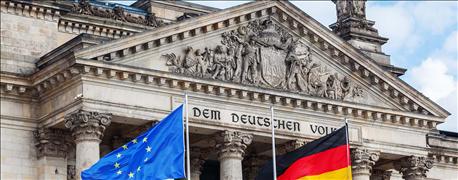
by Patrick Donahue and Naomi Kresge
German lawmakers called on regulators to curb Bayer AG’s $66 billion takeover of U.S. seed giant Monsanto Co. in a skepticism-laced parliamentary session that highlights the backlash to the deal Bayer faces in its home market.
Related: Senate Judiciary Committee holds hearing on wave of mergers in ag

German lawmakers called on regulators to curb Bayer AG’s $66 billion takeover of U.S. seed giant Monsanto Co. in a skepticism-laced parliamentary session. (Photo: Christian Mueller/Thinkstock)
The debate Wednesday in the lower house of parliament, called by the opposition Green Party, laid bare the depth of resistance to Bayer buying a U.S. company that many Germans view as a champion of genetically-modified crops and a weedkiller they believe might cause cancer. Eight of the 12 lawmakers who spoke, including parliamentarians from within Chancellor Angela Merkel’s coalition, cast doubt on the acquisition.
“More than 70% of Germans say they don’t want genetically-modified food on their plates, but that’s exactly part of the strategy of this merger,” said Katharina Droege, a legislator from the Greens. She warned of “massive negative consequences” for consumers and called on regulators to block the takeover. Lawmakers have no legislative authority to stop the deal.
Buying Monsanto would give Bayer, based in the industrial western German city of Leverkusen, about 35% of the global market for seeds and farm chemicals. The drug and chemicals conglomerate is considering dropping the Monsanto name to avoid sullying its reputation, according to people familiar with internal discussions at Bayer who asked not to be named because the talks are private. No decision has been made. The deal also faces antitrust reviews in some 30 jurisdictions worldwide.
Price Gap
Investors have shown skepticism that the deal will go through. Monsanto closed at $104.36 in New York on Wednesday, 19% below Bayer’s $129-a-share offer. Bayer slumped 0.1% to 91.84 euros at 10:25 a.m. on Thursday in Frankfurt; the stock has plunged about 30 percent since talks with Monsanto were first reported.
Related: Bayer closes deal on Monsanto for $66 billion
The Bayer-Monsanto deal comes as the number of players in the industry shrinks. China National Chemical Corp. is planning to buy Syngenta AG, and DuPont Co. and Dow Chemical Co. are seeking to combine and create a new crop-science unit. The deals are drawing scrutiny in the U.S. as well, with one lawmaker in a U.S. Senate hearing Tuesday referring to a “tsunami” of consolidation.
Related: Dow-DuPont shareholders approve $59 billion merger of equals
Related: ChemChina clinches U.S. security nod for Syngenta purchase
Antitrust Concerns
In a debate that cut across Merkel’s coalition, three Social Democrats from the governing alliance crossed the aisle to join opposition Greens and Left Party lawmakers to raise antitrust and environmental concerns. One lawmaker from Merkel’s Christian Democratic Union, Hermann Faerber, himself a farmer, also voiced skepticism. Faerber said that excessive consolidation among suppliers will put pressure on German growers who are already facing mergers among the food companies that are their customers.
“The simple German farmer will be caught more and more between two millstones,” Faerber said.
The political criticism contrasted with a more positive take from Merkel’s government. Agriculture Minister Christian Schmidt told Mittelbayerische Zeitung on Tuesday that the deal holds “great potential” for digital technology and innovation.
“I have the firm expectation that Bayer will transfer its sustainability strategy to the new parts of the company,” Schmidt said.
Scientists and regulators broadly agree that GMO foods pose no more risk to health and the environment than ingredients developed through older breeding methods.
For more on the debate about GMOs and engineered foods, click here.
Deal Support
In the Bundestag on Wednesday, amid jeers from the opposition, four lawmakers -- all from Merkel’s CDU-led bloc -- either sided with Bayer or called on legislators to wait for an assessment from the European Union’s antitrust commission.
“What you’re holding here is not a conversation, it’s demonization – of a company, of an entire industry and an entire technology,” Kristina Schroeder, Merkel’s former family minister, told the chamber.
CDU lawmaker Matthias Heider said the parliamentary debate was premature and accused critical colleagues of “exerting political pressure” on regulators.
Make ‘Afraid’
“Bayer’s takeover of Monsanto will create the No. 1 agro-chemical company in the world,” Heider said. “I’d say that’s rather an advantage than disadvantage.”
Still, most of the tenor was against the deal. A Left Party lawmaker, Eva Bulling-Schroeter, said the takeover would create “an unparalleled supercompany” that should “make us afraid.”
After Bayer and Monsanto tie up, creating a market leader with $26 billion in combined revenue from agriculture, the number of seed and crop companies in the world will shrink to just four, from at least half a dozen global players a year ago.
“I hope that the monopoly regulators look very closely at this,” said Elvira Drobinski-Weiss, a lawmaker from the governing Social Democrats. “I’m seeing here a massive market concentration and market dominance.”
Related: Agrium and Potash Corp. agree to merge
--With assistance from Tony Czuczka.
To contact the reporters on this story: Patrick Donahue in Berlin at [email protected]; Naomi Kresge in Berlin at [email protected]
To contact the editors responsible for this story: Alan Crawford at [email protected]; Chitra Somayaji at [email protected]
Chad Thomas
© 2016 Bloomberg L.P
About the Author(s)
You May Also Like




